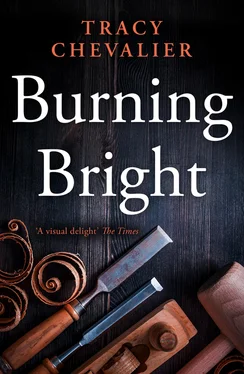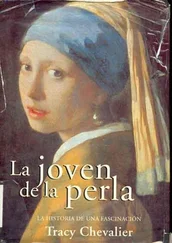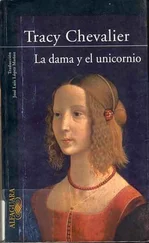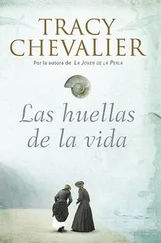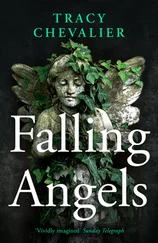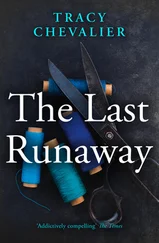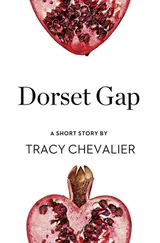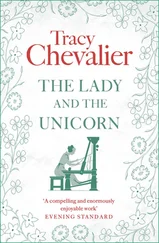‘Far as I know, this is Mr Astley’s house, not yours,’ Maggie said cheekily.
Miss Pelham turned to Jem. ‘Jem, what is this girl doing here? She’s not a friend of yours, I trust?’
‘She – she’s made a delivery.’ Even in the Piddle Valley, Jem had not been a good liar.
‘What did she deliver? Four-day-old fish? Laundry that’s not seen a lick of lye?’
‘Nails,’ Maggie cut in. ‘I’ll be bringing ’em by reg’lar, won’t I, Jem? You’ll be seein’ lots more o’ me.’ She stepped sideways off Miss Pelham’s front path and into her front garden, where she followed the tiny hedge around in its pointless circle, running a hand along the top of it.
‘Get out of my garden, girl!’ Miss Pelham cried. ‘Jem, get her out of there!’
Maggie laughed, and began to run around the hedge, faster and faster, then leaped over it into the middle, where she danced around the pruned bush, sparring at it with her fists while Miss Pelham cried, ‘Oh! Oh!’ as if each blow were striking her.
Jem watched Maggie box the leafy ball, tiny leaves showering to the ground, and found himself smiling. He too had been tempted to kick at the absurd hedge, so different from the hedgerows he was used to. Hedges in Dorsetshire were made for a reason, to keep animals in fields or off paths, and grown of prickly hawthorn and holly, elder and hazel and whitebeam, woven through with brambles and ivy and traveller’s joy.
A tap on the window upstairs brought Jem back from Dorsetshire. His mother was glaring down at him and making shooing motions at Maggie. ‘Er, Maggie – weren’t you going to show me something?’ Jem said. ‘Your – your father, eh? My pa wanted me to – to agree on the price.’
‘That’s it. C’mon, then.’ Maggie ignored Miss Pelham, who was still shouting and swatting ineffectively at her, and pushed through the ring of hedge without bothering to jump it this time, leaving behind a gap of broken branches.
‘Oh!’ cried Miss Pelham for the tenth time.
As Jem moved to follow Maggie into the street he glanced at Mr Blake, who had remained still and quiet, his arms crossed over his chest, while Maggie had her fun with the hedge. He did not seem bothered by the noise and drama. Indeed, they had all forgotten he was there, or Miss Pelham would not have cried ‘Oh!’ ten times and Maggie would not have beaten the bush. He was looking at them with his clear gaze. It was not a look like that of Jem’s father, who tended to focus on the middle distance. Rather Mr Blake was looking at them, and at the passers-by in the street, and at Lambeth Palace rising up in the distance, and at the clouds behind it. He was taking in everything, without judgement.
‘A’rernoon, sir,’ Jem said.
‘Hallo, my boy,’ Mr Blake replied.
‘Hallo, Mr Blake!’ Maggie called from the street, not to be outdone by Jem. ‘How’s your missus, then?’
Her cry revived Miss Pelham, who had sunk into herself in Mr Blake’s presence. ‘Get out of my sight, girl!’ she cried. ‘I’ll have you whipped! Jem, don’t you let her back in here. And see her to the end of the street – I don’t trust her for a second. She’ll steal the gate if we don’t watch her!’
‘Yes, ma’am.’ Jem raised his eyebrows apologetically at Mr Blake, but his neighbour had already opened his gate and stepped into the street. When Jem joined Maggie, they watched as Mr Blake walked down Hercules Buildings towards the river.
‘Look at his cocky step,’ Maggie said. ‘And did you see the colour in his cheeks? And his hair all mussed? We know what he’s been up to!’
Jem would not have described Mr Blake’s pace as cocky. Rather he was flat-footed, though not plodding. He walked steadily and deliberately, as if he had a destination in mind rather than merely setting out for a stroll.
‘Let’s follow him,’ Maggie suggested.
‘No. Let him be.’ Jem was surprised at his own decisiveness. He would have liked to follow Mr Blake to his destination – not the way Maggie would do it, though, as a game and a tease, but respectfully, from a distance.
Miss Pelham and Anne Kellaway were still glaring at the children from their positions. ‘Let’s be going,’ Jem said, and began to walk along Hercules Buildings in the opposite direction from Mr Blake.
Maggie trotted after him. ‘You’re really comin’ with me?’
‘Miss Pelham told me to see you to the end of the street.’
‘And you’re goin’ to do what that old stick in a dress wants?’
Jem shrugged. ‘She’s the householder. We’ve to keep her happy.’
‘Well, I’m goin’ to find Pa. You want to come with me?’
Jem thought of his anxious mother, of his hopeful sister, of his absorbed father, and of Miss Pelham waiting by the stairs to pounce on him. Then he thought of the streets he did not yet know in Lambeth, and in London, and of having a guide to take him. ‘I’ll come with you,’ he said, letting Maggie catch up and match his stride so that they were walking side by side.
Dick Butterfield could have been in one of several pubs. While most people favoured one local, he liked to move around, and joined several drinking clubs or societies, where the like-minded met at a particular pub to discuss topics of mutual interest. These nights were not much different from other nights except that the beer was cheaper and the songs even bawdier. Dick Butterfield was constantly joining new clubs and dropping old ones as his interests changed. At the moment he belonged to a cutter club (one of his many occupations had been as a boatman on the Thames, though he had long ago lost the boat) a chair club, where each member took turns haranguing the others about political topics from the head chair at a table; a lottery club, where they pooled together on small bets that rarely won enough to cover the drinks, and where Dick Butterfield was always encouraging members to increase the stakes; and, by far his favourite, a punch club, where each week they tried out different rum concoctions.
Dick Butterfield’s club and pub life was so complicated that his family rarely knew where he was of an evening. He normally drank within a half-mile radius from his home, but there were still dozens of pubs to choose from. Maggie and Jem had already called in at the Horse and Groom, the Crown and Cushion, the Canterbury Arms and the Red Lion, before they found him ensconced in the corner of the loudest pub of the lot, the Artichoke on the Lower Marsh.
After following Maggie into the first two, Jem waited for her outside the rest. He had only been inside one pub since they arrived in Lambeth: a few days after they moved in, Mr Astley called to see how they were getting on, and had taken Thomas Kellaway and Jem to the Pineapple. It had been a sedate place, Jem realised now that he could compare it with other Lambeth pubs, but at the time he’d been overwhelmed by the liveliness of the drinkers – many of them circus people – and Philip Astley’s roaring conversation.
Lambeth Marsh was a market street busy with shops and stalls, and carts and people going between Lambeth and Blackfriars Bridge towards the city. The doors to the Artichoke were open, and the sound poured across the road, making Jem hesitate as Maggie pushed past the men leaning in the doorway, and wonder why he was following her.
He knew why, though: Maggie was the first person in Lambeth to take any interest in him, and he could do with a friend. Most boys Jem’s age were already apprenticed or working; he had seen younger children about, but had not yet managed to talk to any of them. It was hard to understand them, for one thing: he found London accents, as well as the many regional ones that converged on the city, sometimes incomprehensible.
Читать дальше
